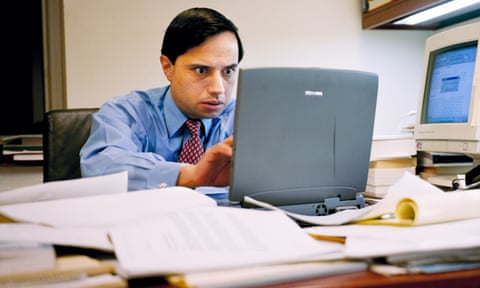One of the first things we knew back in early 2020 was that we wouldn’t be going to work for a while. We thought that we would take a quick break – a week, maybe – and then reassess. So we cleaned out our cubicles and desks, and grabbed a few snacks from the kitchen (and toilet paper from the bathroom). One week became two, which became a month, which became a series of question marks spanning endlessly into the future, as the Zooms and FaceTimes and home office conversions gradually made the very idea of spending our workdays with other people seem like a quaint memory. Like childhood birthday parties, or answering machines, or properly functioning democracy.
Some of us might never go back. Every so often we will hear about companies reassessing their relationship to the office, which has been proved unnecessary or at least outdated.
Maybe it’s better. Maybe the fuel we save and traffic we avoid is better, in the long run, and it took this forced separation to reveal that.
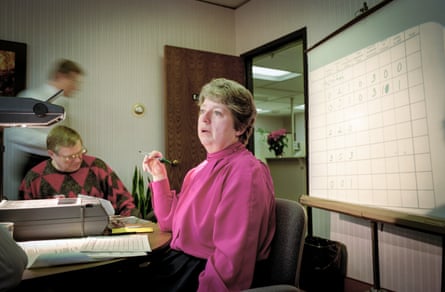
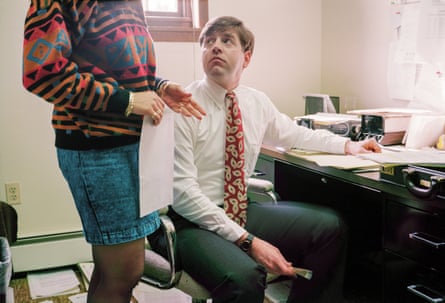
‘In 1987,’ photographer Steven Ahlgren says, ‘when I was bored and unfulfilled, working as a banker in Minneapolis, I began taking frequent trips to look at a painting by Edward Hopper, Office at Night. What first drew me was its setting, which I related to each and every workday at the bank. But what kept pulling me back was its ambiguous narrative – who were these two people, what was their relationship, and why was the woman looking at that piece of paper on the floor?’
But I’m a defender of the office, despite all its annoyances. I’m here to pay tribute to the big, dumb, lumbering buildings, with their slow elevators and water coolers, and common bathrooms with mysterious and disconcerting odours. I’m standing up for the poorly designed parking lot, the faulty wifi router in conference room B that drives everyone nuts, the bundles of power cords and the sun-faded personal photos hanging at a five-degree angle because Janice from accounts knocked the holes into the plasterboard too close together.
Maybe I’m biased. I wrote for the American version of the ultimate workplace show, The Office, for its first four seasons. That show, like its British predecessor, didn’t exactly celebrate the concept of a common workplace as much as present it as a necessary and banal evil. It’s simply the place, said Wernham Hogg sales representative Tim Canterbury, where you share a bit of carpet with other people for eight hours a day, and that shared bit of carpet might be all you have in common.
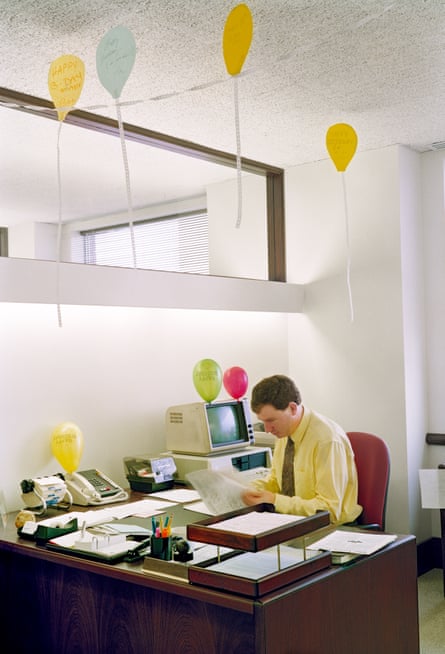

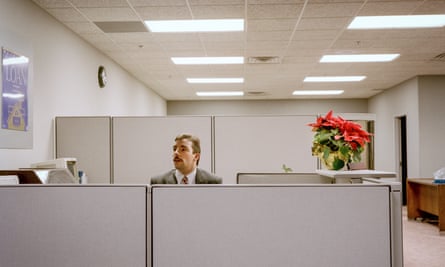
‘I am reminded of these photos every time I enter an office building,’ Ahlgren says, ‘or overhear a fragment of conversation about office life: a promotion won or lost, the challenges of a new firm, a difficult relationship with a superior or subordinate. Sometimes I remember these conversations and try to imagine how the moment described would have looked as a picture.’
It is not exactly the most romantic ode, but after two years of commuting from my bedroom to my living room, a shared bit of carpet sounds delightful. Because, for all its problems, the office is one of the only places we encounter and have to deal with other people.
This was true before the pandemic. The world had already atomised. Should we head to the grocery store? Eh, let’s just have them delivered. Need to buy a book, a toy, a flashlight, a humidifier? Why drive to the shop when we can order it from our couch as we watch Netflix? The one place we reliably bumped into other people, the one place we knew we had to share a bit of carpet, was at work.
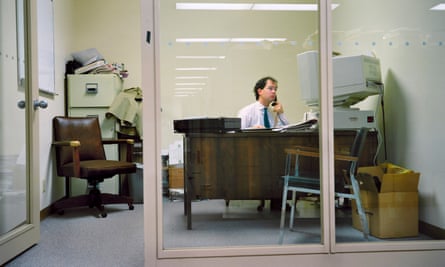
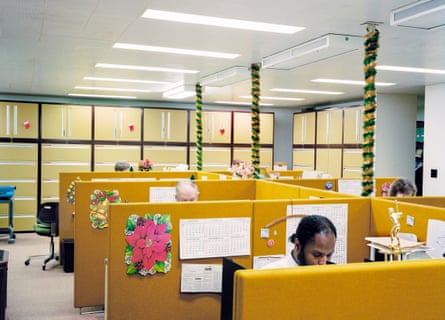
‘It wasn’t until I’d left banking to study photography that I went into an office with a camera to try and portray some of these ideas. I eventually worked at this project from 1990 to 2001, in law firms, insurance companies, government agencies, but always with the same approach: nothing would be staged and only the light that was available would be used.’
I would imagine that, for many, the loss of that shared carpet was something to celebrate, not mourn. I get it. Offices can be sites of drudgery, emotional pain, or even abuse at the hands of cruel co-workers or bosses. Working from home has also given some of us the chance to spend more time with our kids. (Although, counterargument: we’ve had to spend all our time with our kids.) I would imagine that, for many, the flexibility to work from home might have been, and might forever be, a blessing.
But a world where we never encounter other people, no matter how annoying or boring they might be, is not the world that humans were designed for. We’re meant to be around each other, gently bumping into each other, exchanging small moments of conversation and mutual interest. We’re meant to share experiences, bond over common annoyances, celebrate each other’s birthdays with dumb hats and cupcakes. The shared office is one of the last places where we can practise being around other people.
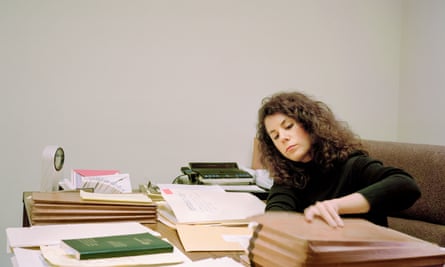
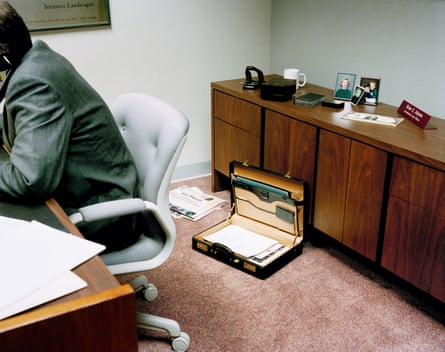
‘As I gradually became more interested in photography and less interested in banking, I began to notice scenes around me that reminded me of Edward Hopper’s paintings. When working late I was fascinated by how the light in some empty offices and corridors appeared almost theatrical.’
I’ve spent the last six years or so reading and writing about ethics. Ethics, in the nutshelliest of nutshells, is the art of negotiating with the people we share bits of carpet with. It’s the art of learning about what others value, comparing that with what we value, and learning how to coexist.
It’s messy and discouraging and frustrating, and it’s also the very essence of being alive. Our offices are ethical laboratories, and we are both the guinea pigs and the scientists.
Again, I will admit my own bias. Not only have I made a living from writing about people in offices, the offices in which I’ve made that living are among the most fun in the world. They’re filled with funny and smart people who make going to work feel like the opposite of “going to work”. The 50 hardest laughs I have had in my life all happened at my job. The same is probably not true for you, which means you may read about the demise of the shared office and say: good riddance.
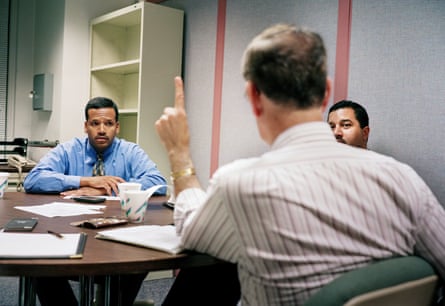
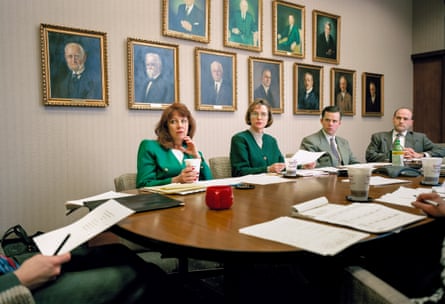
‘In meetings, my attention would occasionally drift from the matter at hand, and I would observe the subtle expressions and gestures of those around me. Sometimes I saw that what was being discussed had profound consequences – professional and personal – for others in the room, although their emotions were usually veiled by professional decorum.’
But something will be lost if we stop working while surrounded by others. There will be one less place on Earth where we have to negotiate with people we didn’t choose to negotiate with. I submit, to those of us who may just now be slowly returning to our desktops and water coolers and wonky wifi routers, that maybe it isn’t all bad.
